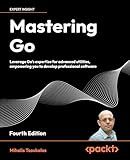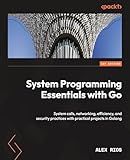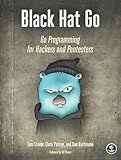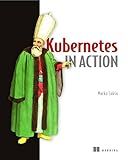Best Golang Programming Books to Buy in January 2026

Mastering Go: Leverage Go's expertise for advanced utilities, empowering you to develop professional software



System Programming Essentials with Go: System calls, networking, efficiency, and security practices with practical projects in Golang



Modern REST API Development in Go: Design performant, secure, and observable web APIs using Go's powerful standard library



Black Hat Go: Go Programming For Hackers and Pentesters
- MASTER GO PROGRAMMING TAILORED FOR HACKERS AND PENTESTERS.
- LEARN ADVANCED TACTICS IN A CAPTIVATING, EASY-TO-READ FORMAT.
- AFFORDABLE PAPERBACK EDITION FOR HANDS-ON HACKING SKILLS.



Kubernetes in Action



Network Programming with Go: Code Secure and Reliable Network Services from Scratch



Go for DevOps: Learn how to use the Go language to automate servers, the cloud, Kubernetes, GitHub, Packer, and Terraform



Event-Driven Architecture in Golang: Building complex systems with asynchronicity and eventual consistency


To generate a random number in Golang, you can use the rand package in the standard library. Here's how you can do it:
- First, import the math/rand package in your Go program.
import ( "math/rand" )
- Seed the random number generator using the rand.Seed() function. This is typically done once at the start of your program or when you want to ensure different random number sequences for each run. If you don't explicitly seed the generator, it will use a default seed value.
rand.Seed(time.Now().UnixNano()) // Seed the generator with the current time
- To generate a random number, you can use the rand.Intn() function. This function takes an integer n as an argument and returns a random number between 0 and n-1.
randomNum := rand.Intn(100) // Generate a random number between 0 and 99
In the example above, randomNum will contain a random number between 0 and 99.
Note that if you need random numbers with a different range or data type, there are other functions available in the rand package, such as rand.Float64() or rand.Int63(), which you can use accordingly.
Remember to import the necessary packages and seed the generator to ensure varying and unpredictable random number sequences.
How to generate a random boolean value in Golang?
To generate a random boolean value in Golang, you can use the rand.Intn() function from the math/rand package. Here is an example of how you can do it:
package main
import ( "fmt" "math/rand" "time" )
func main() { // Seed the random number generator with the current time rand.Seed(time.Now().UnixNano())
// Generate a random number between 0 and 1
randomNumber := rand.Intn(2)
// Convert the random number to boolean
randomBoolean := randomNumber == 1
fmt.Println(randomBoolean)
}
In this example, we first need to seed the random number generator using rand.Seed(time.Now().UnixNano()) to ensure that we get different random values every time we run the program.
Then, we use rand.Intn(2) to generate a random number between 0 and 1 inclusive. Since rand.Intn() returns a value between 0 and n-1, passing 2 as the argument will give us either 0 or 1.
Finally, we convert the random number to a boolean by checking if it is equal to 1 (randomNumber == 1). If it is equal to 1, the boolean value will be true; otherwise, it will be false.
The program then prints the random boolean value to the console.
What is the effect of time.Sleep in generating random numbers in Golang?
The time.Sleep function in Golang pauses the execution of the current goroutine for a specified duration. It does not directly affect the generation of random numbers in Golang.
Random numbers in Golang are generated using the math/rand package, which uses a default source of randomness that is initialized once per program execution by the math/rand.Seed function. This seed is not affected by time-dependent functions like time.Sleep.
However, in certain scenarios where the random seed is based on current time or is changed during the execution, delaying the program using time.Sleep can affect the random number generation. For example, if the seed is based on the current time, calling time.Sleep will advance the current time, which in turn can result in a different seed for generating random numbers.
It's important to note that time.Sleep itself does not generate any randomness. Its purpose is to introduce a pause in the execution of a program, while random numbers are generated separately using other functions and packages in Golang.
How to generate a random integer in a specific range in Golang?
To generate a random integer within a specific range in Golang, you can make use of the rand package. Here's an example of how you can generate a random integer within a specific range:
package main
import ( "fmt" "math/rand" "time" )
func main() { // Set the seed value to ensure different random numbers on each run rand.Seed(time.Now().UnixNano())
// Generate a random integer in the range of 0 to 100
randomInt := rand.Intn(101)
fmt.Println(randomInt)
}
In the above example, rand.Intn(101) generates a random integer between 0 and 100 (inclusive) since it takes the upper bound as an argument. You can modify the upper bound value as per your desired range.
How to generate a random number every time the program runs in Golang?
To generate a random number every time the program runs in Golang, you can use the math/rand package along with the time package.
Here's an example code snippet:
package main
import ( "fmt" "math/rand" "time" )
func main() { // Setting the seed value to the current time rand.Seed(time.Now().UnixNano())
// Generating a random number between 0 and 100
randomNumber := rand.Intn(101)
fmt.Println(randomNumber)
}
In this code:
- The rand.Seed(time.Now().UnixNano()) line sets the seed value for the random number generator. By using time.Now().UnixNano() as the seed, it ensures that a new seed is generated every time the program runs, resulting in a different sequence of random numbers.
- The rand.Intn(101) line generates a random number between 0 and 100. You can modify the upper limit according to your requirements.
- Lastly, the generated random number is printed using fmt.Println(randomNumber).
What is the impact of seeding the random number generator with the same value repeatedly?
Seeding the random number generator (RNG) with the same value repeatedly will have the following impact:
- Reproducibility: When the RNG is seeded with the same value, it will generate the same sequence of random numbers every time. This is useful in scenarios where you want to reproduce the same set of random numbers for testing or debugging purposes.
- Lack of randomness: One of the primary objectives of an RNG is to provide a sequence of numbers that appear random and unpredictable. However, when the RNG is consistently seeded with the same value, the generated sequence becomes deterministic and loses its randomness. This can lead to biased or non-random results in applications that depend on truly random numbers.
- Vulnerability to attacks: Some cryptographic algorithms and security systems rely on the quality of the random numbers generated. If the RNG is seeded with the same value repeatedly, it becomes more susceptible to attacks like seed prediction or brute forcing, as an attacker can potentially determine or narrow down the sequence of numbers being generated.
- Periodicity: Most RNGs have a finite period, meaning that the generated sequence will eventually repeat itself. When the RNG is always seeded with the same value, the period becomes more noticeable and predictable. This can lead to issues in applications where long periods or non-repeating sequences of random numbers are required.
In summary, repeatedly seeding the RNG with the same value can impact the reproducibility, randomness, security, and unpredictability of the generated sequence of random numbers. It is generally advisable to use different and sufficiently random seed values to achieve the desired randomness and security properties.
How to generate a random number within a normal distribution in Golang?
To generate a random number within a normal distribution in Golang, you can use the math/rand and math packages. Here's an example code that demonstrates this:
package main
import ( "fmt" "math" "math/rand" "time" )
func main() { // Seed the random number generator with the current time rand.Seed(time.Now().UnixNano())
// Generate a random number within a normal distribution with mean 0 and standard deviation 1
randomNumber := rand.NormFloat64()
// Scale the random number to fit your desired range
mean := 5.0 // mean of the normal distribution
stdDev := 2.0 // standard deviation of the normal distribution
randomNumber = (randomNumber \* stdDev) + mean
fmt.Println(randomNumber)
}
In this code, we call rand.NormFloat64() to generate a random number within a standard normal distribution (mean = 0, standard deviation = 1). We then scale the generated number using the desired mean and standard deviation to fit the desired range.
What is the default seed value for generating random numbers in Golang?
In Go, the default seed value for generating random numbers is 1.
